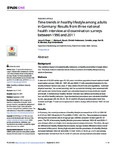Time trends in healthy lifestyle among adults in Germany: Results from three national health interview and examination surveys between 1990 and 2011
Finger, Jonas D.
Busch, Markus A.
Heidemann, Christin
Lange, Cornelia
Mensink, Gert B. M.
Schienkiewitz, Anja
Background
The combined impact of multiple healthy behaviors on health exceeds that of single behaviors. This study aimed to estimate trends in the prevalence of a healthy lifestyle among adults in Germany.
Methods
A data set of 18,058 adults aged 25–69 years from three population-based national health examination surveys 1990–92, 1997–99 and 2008–11 with complete information for five healthy behavior factors was used. A ‘daily intake of both fruits and vegetables, ‘sufficient physical exercise’, ‘no current smoking’ and ‘no current risk drinking’ were assessed with self-reports and ‘normal body weight’ was calculated based on measured body weight and height. A dichotomous ‘healthy lifestyle’ indicator was defined as meeting at least four out of five healthy behaviors. Age-standardized prevalence was calculated stratified by sex, age groups (25–34, 35–44, 45–54 and 55–69 years) and education level (low, medium and high). Trends were expressed in relative change (RC) between 1990–92 and 2008–11.
Results
In Germany, the overall prevalence of healthy lifestyle increased from 9.3% in 1990–92 to 13.5% in 1997–99 and to 14.7% in 2008–11 (RC: +58.1%). The prevalence increased among men and women and in all age groups, with the exception of men aged 45–54 years. The RC of increasing healthy lifestyle prevalence between 1990–92 and 2008–11 was stronger albeit on a higher level among women compared to men. Therefore, the gender difference in healthy lifestyle has increased, but age-related differences have overall decreased in this period. Among high educated men the prevalence of a healthy lifestyle increased between 1990–92 and 2008–11 from 10.6% to 16.3% (p = 0.01) and among high educated women from 16.4% to 30.3% and also among medium educated women (10.9 to 16.6, p<0.01), but no significant increase in healthy lifestyle prevalence was observed among men with low and medium education and among women with low education level.
Conclusions
The prevalence of a lifestyle with at least four out of five healthy behaviors markedly increased from 1990–92 to 2008–11. Nevertheless, additional health promotion interventions are needed to improve the number of combined healthy behavior factors and the awareness in the population that each additional healthy behavior factor leads to a further improvement in health, especially in men in the age-range 45 to 54 years, and among persons with low education level.

